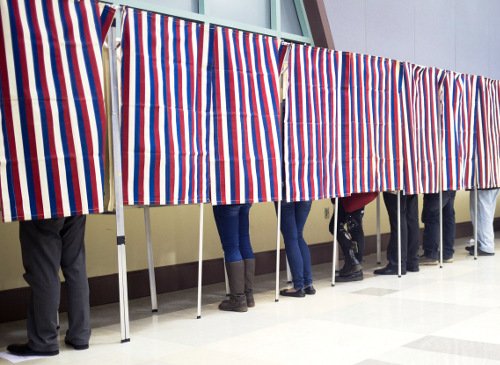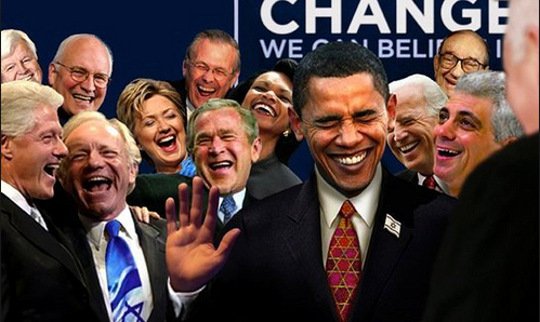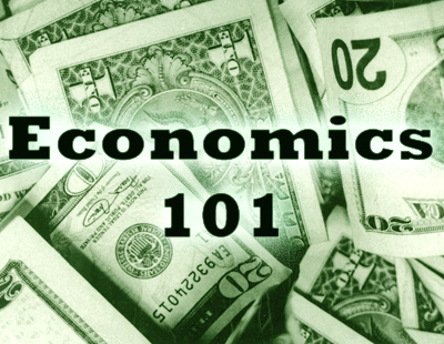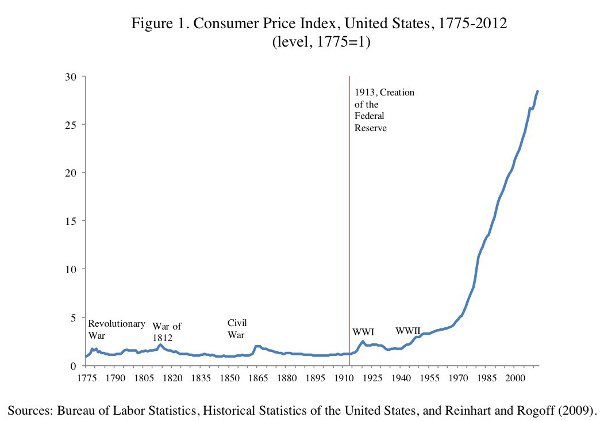What's Wrong With Free Money?

Left or right, politicians are nothing but scam artists. Since they produce nothing of value themselves, and everything they give away they first had to steal from someone else (via “taxes”), it’s impossible for them to be anything other than scam artists. They are forever trying to come up with some new sales pitch for some scheme that will enrich and empower themselves, but which sounds like it’s intended to help “the people.” What politicians do is wield power—they issue commands, enforced by their army of unthinking mercenaries, which always results in the common people being restricted, controlled and extorted. There is no other way to use threats of violence, which is what all “laws” are. The idea that they do this because that want to help the very people whom they are coercively controlling is patently ridiculous. And yet voters fall for it, over and over again.

One of the scams pushed by the soulless parasites is the notion of “universal basic income” or "UBI": the idea that, just as a result of existing, everyone is magically entitled to a certain amount of prosperity, income and wealth. Unfortunately, this political Tooth Fairy approach seems to work well on the economically ignorant, which includes most people. After all, it sounds so nice—so caring and generous. What could possibly be destructive or malicious about giving everyone free stuff?
If someone is picturing themselves as the recipient of that free stuff (which is how the slimy politicians want and expect people to think about it), what’s not to like? “Yay, even if I sit on my butt all day doing nothing, I’ll have enough money for food, shelter, and other stuff! That’s awesome!” But even the average economic ignoramus still probably will feel a little twinge, deep inside their soul, saying things like, “Wait, where is it coming from?” But a lot of people will try to stomp on that little voice to silence it. “Shut up! It’s free stuff, and I deserve it!” And when that happens, somewhere a politician chuckles.

Let’s examine some of the levels of deviousness beneath the “basic income” ploy, which is disguised as a benign, altruistic idea.
1 - The most basic—and what should be the most obvious—problem is that, in order for “government” to give wealth to one person, it has to take it from someone else. And mainly it does that through the extortion known as “taxation.” Does anyone think the politicians are giving their own money away? If the politicians were honest, their campaign would say, “I’m going to take some of your neighbor’s stuff and give it to you!” However, most voters don’t want to hear that, and don’t want to cheer for that. They’re happy to receive “free” stuff as long as they don’t have to see, or hear about, or even know about, the violence it took to wrestle the loot away from someone else.
2 - But good old-fashioned extortion is not the only thing that is conniving and destructive about the “basic income” bunk. And again, if people would listen to their inner voices, many would instinctively know it. “Wait, if it would be great for everyone to get $3,000 a month for free, just for being alive, then why not $1,000,000 a month? How could that possibly work? Something is fishy!” For this level of deception, a very brief economics lesson is in order:

Having dollars does not, all by itself, make you rich. If you had a million dollars and were alone on an island with no food and water, would you be rich? Dollars are only worth what you can trade them for, what you can buy with them. A simple thought experiment illustrates the point: what happens if we print $7,000,000,000,000,000 in new currency, and give a million dollars to everyone on Earth? Will we then all be rich? Of course not, because the amount of valuable stuff in the world—the amount of actual wealth—won’t have changed at all. Only the supply of currency will have changed, and the result of that is called “inflation.” The short version is, if you have twice as many dollars as you did last week, but each of your dollars only buys half of what they did last week, then you are exactly where you started. You’re basically just changing a unit of measurement, while not adding anything of actual value.
This would be a little like politicians promising to make everyone taller by declaring that ten inches, instead of twelve, now counts as a foot. Yay, now the vast majority of adults are over six feet tall! … Except not really. Obviously. However, while changing how many inches are in a foot would be stupid and problematic, it wouldn’t be downright evil. But when “monetary policy” (a euphemism for fabricating fake money) devalues the dollar, that constitutes theft from everyone in possession of dollars. If you saved up $1,000, and suddenly it was worth half as much, you’ve been robbed. What makes the robbery clever is that most people don’t understand it, and think that “inflation” must be some natural, unavoidable, benign phenomenon. It is none of those.

3 - But in the long run, one of the most destructive aspects of “free stuff from government”—seen most obviously in outright communism—is that it automatically makes people overall less prosperous, by paying people to not be productive. Again, a simple example illustrates the point. Suppose tomorrow “government” printed and handed out a million dollars to every man, woman and child in the country. Even ignoring the aspect of “inflation,” what would happen? Well, since we’d all be (supposedly) rich, no one would have any incentive to do anything they didn’t want to do. The vast majority of people would quit their jobs, and “retire,” knowingly they could afford an easy life for the rest of their days.
But they would be wrong. Fatally wrong. With no one producing anything—no farming, no manufacturing, no products, no services—there would quickly be nothing to buy (including food) with all of those excess, worthless dollars.
Again, if the actual stuff that people want and need doesn’t exist (because no one is producing it), then the people are poor, regardless of how many pieces of paper they have in their pockets. And having the state giving everyone “free money” would literally amount to paying people to not be productive, thus pushing society as a whole towards poverty. We could all sit around counting our dollars as we starve to death. Hooray for socialism!

4 - Ironically, if politicians were merely selfish and greedy for unearned wealth, they would do a lot less damage than they currently do. It is their love of power and their desire for control and dominion that makes them so vile, and so dangerous. If Congress just directly robbed the people enough to give every politician a billion dollars, and did nothing else, “government” would be far less destructive, and less expensive, that it is now. Now it’s time to look at what makes the “charity by government” racket truly anti-humanity (as if mass extortion wasn’t bad enough).
The reason ruling classes push for “welfare” programs, or things like Social Security, or Medicare and Medicaid, or public housing projects—and the reason some push the “universal basic income” nonsense—is not because they give a crap about you, or anyone else. It is because they are trying to create a class of helpless, dependent people who are incapable, mentally and physically, of taking care of themselves. Every ruling class, as an excuse to even exist, has to convince its victims that they need it, that they could not survive without it. And one of the best ways to do that is to make it more and more difficult to be self-sufficient. It is the equivalent of caging a wild animal, and feeding it until it is fat, weak, and has forgotten how to take care of itself.

There are countless examples of intrusive and restrictive “legislative” that were sold as ways to “protect the public,” which are actually intended to make it harder and harder for people to survive and thrive without “government” assistance. A few examples are: a) regulations and licensing requirements making it more and more difficult and expensive for normal people to make and run their own businesses; b) higher taxes and more kinds of taxes, on all sorts of things, designed to forever keep people in debt and/or barely treading water financially; c) zoning and occupancy regulations making it ridiculously expense to have a “legal” residence; d) regulations and restrictions making things like food and transportation far more expensive; e) “laws” which specifically forbid people from doing or producing a lot of things for themselves (including things as absurd as collecting their own rain water).
Then, after making life so expensive, inconvenient and complicated, the same crooked bastards who intentionally created that situation pretend to be all loving and caring by giving away “free” stuff, in order to make the people dependent on them. Or, as Harry Browne put it, “Government is good at one thing: It knows how to break your legs, hand you a crutch, and say, ‘See, if it weren't for the government, you wouldn't be able to walk.’”

5 - Lastly, and perhaps most despicably, the real motivation behind scams like “universal basic income” is politicians trying to buy the blind loyalty of as many peasants as possible. As George Bernard Shaw put it, “A government that robs Peter to pay Paul can always depend on the support of Paul.” If the politicians can get a large segment of society—a majority of their victims—loudly demanding such wealth redistribution schemes, and condemning any who oppose the idea, the political crooks can act as if they are just doing the “will of the people,” just representing what the majority wants. What those in power most want to see is throngs of entitlement-mentality dependents of the state talking about how they deserve more free stuff, and how they and the candidates they vote for are compassionate and caring for condoning mass extortion.
Whether it’s the elderly demanding their Social Security, or the sick demanding “free healthcare,” or the poor demanding bigger “welfare” checks, what serves tyrants best is to have the people themselves demanding mass extortion and authoritarian domination. Politicians love nothing more than to manipulate and deceive people into being divided, and bitter, and envious, and forever begging a ruling class to make things “fair.” In the end, the politicians always win such games, and everyone else—including those silly enough to have cheered for it—loses. “Universal basic income” is just the latest label and packaging for the same old destructive and profoundly evil scam.

Larken, you know I love your ideas and sparing with you a bit on them. When it comes to UBI, I think there are many layers and it can be challenging to see past our own biases. I too thought as you do about UBI and MMT (modern monetary theory). I'm a big fan of Austrian economics (from what I understand of it) and the concept that value is only determined in the moment of transaction. It's all about perception. There is no "intrinsic" to it.
Most of your points here deal with how much a train wreck it would be if government ran a UBI and I'm in complete agreement with you there. That said, what if a UBI could be run via blockchain protocols?
I wrote about that a year ago: Does the World Need a Universal Basic Income? Could Steem Power It?
What I fail to see in your analysis:
Human beings, within our lifetimes, may be physically incapable of providing enough value to their fellow human beings to support themselves through their own labor and efforts. Automation is coming and it's not like the invention of agriculture where people will just move on to other things. There will be no other things. Those who are studying AI and automation know this. Read Nick Bostrom's Superintelligence for a primer on where this is headed.
Where does value really come from? Is it an emergent property? Have we, as a species, all benefitted by the combined efforts of millions and millions of people? If so, where is all that emergent value and who "owns" it, individually? In my opinion, we all own it because it truly is emergent. If we can structure systems which extract it equitably and distribute it via non-violent means, why wouldn't we? Today, the financial system is rigged so those who violently control others get to extract all that value for themselves. We should be experiencing trillions of dollars of deflation because of all that emergent value. Instead, we see just a bit of inflation. Why not massive hyper inflation when trillions of dollars are pumped into the system? Again, because we should be seeing deflation. Things should be getting better, cheaper, and faster for everyone.
Cryptocurrency changes everything. Where did the money come from you'll get when this post cashes out? How did a pizza go for 10,000 BTC in May of 2010 to be worth many millions today? These things are forcing us to truly understand where value comes from and once we do that we can abandon the primitive idea that work, for work's sake, is somehow good. Digging ditches and filling them in again doesn't provide value. True work has to change reality and provide value. Cryptocurrency protocols allow for us to rethink value distribution without violence. Without it, what are the alternatives?
If AI and automation end up providing value exponentially better than humans ever could, what will the future look like? I'm not one to make decisions out of fear or to prematurely optimize, but I'm also not one to bury my head in the sand of my ideology and ignore rationality and the signs of what's coming.
In my opinion, based on the many lectures and books I've read on the topic, AI will change everything and we should not ignore this. For more on that, check out The Morality of Artificial Intelligence and the Pindex board I link to there. If AI will change everything, what are we going to do about it? Won't mothers and fathers riot in the streets demanding someone (government) "do something" to help them? Won't they eventually turn to violence and theft in order to feed their family if there literally is no work available to them which can't be done exponentially cheaper and better by an AI system?
What solutions are we bringing to the table? If we care about the NAP and non-violence, how are we going to ensure wellbeing goes up and violence goes down in this situation?
To counter my own biases on this topic, I spent two years reading various articles shared in UBI Facebook groups. I wanted to better understand this "free money" idea which seemed, on the surface, so ridiculous to me. I'm glad I did that, because it helped me understand what's happening. Just like always, those in power within government are using this situation to increase their own power and control. We can and should clearly show how dangerous that is. At the same time, I don't think we do humanity any favors by ignoring the problems UBI is trying to address before they become systemic.
How much research have you done into the threat of AI and automation? What solutions do you have that don't include some aspect of a UBI?
(I hope you see this comment and feel it's worth responding to. I don't often upvote my own comments, but will in this case for visibility.)
There is an aspect of this I haven't seen many people mention. The presence in the world of a lot more useful stuff ("wealth"), whether created by robots or people, doesn't make anyone less rich. It does, however, as you pointed out, make it harder for some people to trade what they have, whether goods or services. Supply and demand, and all that. However, the reason I'm not at all scared of AI and automation is that, without "government" coercion, nothing would be stopping people from building their own homes and living off the land, and what they DO have to trade (mostly their own brain and muscle power) will buy a lot, when there is that much stuff in the world. Ironically, I think an "excess" of valuable stuff will push more people into being SELF-sufficient, which I think is a good thing. On top of that, it makes actual charity--whether just one-on-one or via some big blockchain version which might look a little bit like UBI, minus the state violence--really damn easy. That has NOTHING to do with people being ENTITLED to anything, and that entitlement mentality ("I exist, therefore the world owes me stuff"), a.k.a. communism ("to each according to his need"), will not lead to good things. However, a voluntarily arranged system of giving ("I don't want anyone being homeless or starving, so I will give some of what is mine") is already taking care of a LOT of people. And with less coercion and more wealth, that just gets easier and easier. In the U.S., for example, starvation isn't a thing anymore. Having been "the poor" myself (thanks in large part to the ruling class) for years, I remind myself how ridiculously RICH "the poor" in the U.S. are. Lastly, I would say that automating the hell out of production is still not going to "make all jobs go away"; it will just make them CHANGE a lot. As long as people still want something, anything, including non-physical things--which will be true forever--"jobs" still exist. They will just be easier, less dangerous, and less about making physical stuff.
Hey Larken! Thanks for replying.
I think we disagree here. We're already starting to see automation take jobs, and it will increase at an exponential rate. If 40-60% of the workforce will be replaced in the next handful of decades (see the research I linked to previously), and if any job they might consider retraining for is already being done via automation, how will they not become less rich? How will they earn money to eat and live?
Living off the land as a homesteader sounds great, and you describe it well in the Iron Web, but it's a fiction. To think the millions of government "educated" people in cities today could just pack up their stuff, get an axe, travel to some unused land, cut down some trees and build a home is not rational. It might be ideal, but it's not probable. The unused resources of the land can not support that many people and the people themselves are not skilled enough to survive. If the answer is "well, let them die then," I have to argue for something better.
Brain power will be primitive compared to commoditized AI. Muscle power only matters if it can provide real value. Digging ditches and filling them up again uses muscle power, but doesn't provide value.
I do think something like a UBI not backed by the violence of government could be part of the answer, and I'm glad to hear you concede that point. I hope you get a chance to read through Dan Larmier's posts on UBI which @kennyskitchen mentioned in his comment. I'm no fan of entitlement either as I've mentioned before (How to Make an Entrepreneur Mad). I do see how a UBI system could increase entitlement in some people, but as I've mentioned, after reading articles shared in UBI Facebook groups for years now, I also recognize the opposite can happen. When people are freed up from survival needs, they move up Maslow's Hierarchy and can provide much more valuable work and take risks which can benefit everyone.
I think this is the part we miss each other. Who owns the emergent wealth caused by the breakthroughs of humanity? Emergent properties are very real things and they transcend one category as they move into the next. A few molecules of H2O can't be called wet, but at some point when you add more they are. The wealth which exists and is created as an emergent property of all our activities is also real. Unfortunately, no individual can claim it, other than those who are already using the power of the state and fiat currency to siphon that value for themselves. What I'm advocating isn't a redistribution as much as a more accurate distribution in the first place of this newly created value much like STEEM is distributed to authors, commenters, and curators today so everyone can share in the emergent value of Steemit.com (already ranked 2,395 on Alexa).
This contradicts the research I've seen from the experts studying this stuff. Yes, I get that experts can be wrong such as the Malthusian Trap, but I'm not convinced they are wrong in this case. People will want something and the corporations and governments who commoditize AI and automation will be able to provide it far cheaper than humans. In that scenario, how will the jobs you describe exist? Even the non-physical things (music, art, writing, gaming) are already being created by AIs today. Soon they will be better than what we can produce because they will better understand the human mind and what it responds to.
I'm not one to be pessimistic (I'm usually accused of being overly optimistic), but I do think if we care about wellbeing we should consider this topic carefully. If we don't put something voluntary in place to deal with the potential future facing us, the government backed by violent force certainly will.
I do think there will be jobs with AI. They will simply shift into the creative, and entertainment spaces. Kind of like interacting on social media, making games for people, making movies, writing poems. I do think there will always be JOBS. Though I think the kind of jobs you look at HELP WANTED to find will become harder and harder to find. It is likely to become more and more and environment where people have to CREATE their job. How that will actually manifest and what new problems will come with it is the great unknown. It definitely should bring its own share of new problems. New things typically do. You are right that AI and Automation are coming. They are coming in a big way. Yet there are still many aspects of the human mind that we do not understand in terms of AI. We can make articles that write posts and stories yet if you see them enough they still are lacking something and they are noticeable. We still have intuition, epiphanies, "wisdom", and many other strange things that our AIs do not simulate yet. It is likely born from these elusive traits of our mind that many jobs will be created. The problem is that not everyone is good at those things. So what about those people?
It is a very interesting topic.
Thanks for the inspiration... well thanks to you and to Larken.
I was inspired to take a stab at being a futurist.
https://steemit.com/future/@dwinblood/the-future-an-optimistic-look
I'm not as confident we as human beings will be able to compete with AIs in the categories you mentioned for very long (games, music, movies, poems, writing, etc). From the research I've seen and the books I've read, these things are coming very, very quickly. Eventually, if we let AI learn exponentially as it may be capable of doing, it will know us better than we know ourselves.
Some smart people are very concerned about that, and they should be. I also think we have the potential for AI to teach us what morality really is (or should be). Also, I think a merging is coming between synthetic and biological "life".
I read a book, Age of EM (Electronic Minds) which I didn't really enjoy all that much, but it did explore some really interesting concepts such as being able to make copies of yourself. What if I had thousands of copies of me responding to Steemit posts just exactly as "I" would? How weird will things get then?
I meant to reply the following to you... but replied to myself instead... so let's try again.
Thanks for the inspiration... well thanks to you and to Larken.
I was inspired to take a stab at being a futurist.
https://steemit.com/future/@dwinblood/the-future-an-optimistic-look
Loved it! Well done. :)
Very well written. I appreciate your balanced approach and the pleasant tone with which you disagree. Upvoted. Happy to follow ya.
Thank you. I have great respect for @larkenrose and think he is one of the best free thinkers of our time. One of the challenges I have (as funny as it may sound) is to find things I disagree with him on. It's quite easy to put people whose ideas we cherish up on a pedestal and begin to think their are infallible. This, I think, leads to destructive tribalism as we all follow the leader/ruler and stop thinking for ourselves. I actively seek out things to disagree with Larken on just so I can keep myself from falling for this trap.
I liked your article and completely agree. I also read lukestrokes long response trying to make us accept that UBI can be good. I'm not buying it. Whenever "we" have tried to experiment with giving groups of people free stuff it has always made that group dependent on more free stuff and set them generations back from progress. I've read quite a bit about these types of social programs that were put into place in Detroit and look what happened... I'm not saying those that are crippled, handicapped, mentally challenged or the like should have to contribute or die. I'm saying that flipping the script from hard work and earning to no need to do either will degenerate our society. It's a disaster waiting to happen.
I'm an engineer. For my position I spend much of my time assessing technology and looking at its trends and how and when our company can benefit from it. History is filled with projections of the devastation that would be caused with the advent of the latest technologies. I could list dozens of examples, but I don't think its necessary. In the end we adapt. Technology will always replace old ways of doing things with new ways that are faster, more efficient and/or cheaper. People will adapt. Unless of course we dumb them down, give them a bunch of free stuff and tell them we will take care of them...
I think you may be comparing apples with oranges. From what I've seen, actual UBI experiments (i.e. not welfare systems based on eligibility requirements, but resources given universally to a group of people) did not show people more dependent on free stuff. On the contrary, when they no longer had to worry about basic survival, they ended up doing even more valuable, risky, and creative work. I know, it's surprising and counter-intuitive, but that's what the data from the pilot programs I've seen so far shows. Just look at all the work people do now for free within open source communities as an example. If peoples' needs are met, they can do more creative work and behavioral psychology shows us intrinsic motivation creates more creative output than extrinsic motivation. The data is out there for the pilot programs which have already been run if you want to engage with it. I thought it was BS also, which is why I joined some Facebook groups a while back to challenge my own perception.
I'm liking this reply a lot.
Blockchains change the game of economics, so thinking of economics as per the "old ways" isn't accurate anymore. Governments have less power over money than they used to, so new ideas such as a form of blockchain communism for instance might actually make sense, and actually work.
I dunno if it would, but eh, if the code is strong enough, it might.
Communism may not be the right word for it (too much historical baggage), but yes, I think the very nature of value changes as technology advances and more people move up Maslow's Hierarchy of needs because of it.
Aye, I felt weird using communism too. It does have a lot of baggage. Personally, I was hoping no one would think I am a communist, and then make fun of me for it or something. -_-
That's just how it is. Communists just don't have a good standing, even if a "commucoin" that actually worked could exist.
The real point is that the game has changed, and it's awesome to finally have a lot more options.
I could envisage a society that inflates it's money supply in a controlled way, and uses this newly created money to pay people a UBI without it causing a melt-down as you describe. The idea is do-able. Steemians that post useful & entertaining stuff are sort of creating this already! , but I totally concur with your assessment of the lying, cheating scumball politicians that seek power over us.... the fact that the UK government is arming & 'assisting' the nut-job Saudi's in their genocide of Yemen at the moment is just sickening....& the charity appeals have already started to help the half a million people over there suffering a cholera epidemic (caused by the Saudi aggression). I'm beginning to think that our politicians are actually evil AND incompetent, not just incompetent.
Feed the government!
Or was I looking for a different f word?
Yes the value of a community's currency derives from the strength of the community.
Nice writing! You are fully right, we are living in a scam for decennia already, because the government always had the monopoly on information. Now since some years the internet changed this and people start to wake up.
Bitcoin and other decentralized technologies are now giving people back their power and ones enough people are awake, this sick and rotten system will finally collapse without the need of any violence (except from the government).
Upvoted, followed and resteemed you!
There is no such thing as free money :D
I agree but in the end it is kinda from one scam to the other:
I am stopping by to tell you about this "new" hype coin:
The exchange with the biggest volume of EmberCoin at the moment: https://www.cryptopia.co.nz/Register?referrer=Bitcoinercph
Here is the price chart of EmberCoin:
https://coinmarketcap.com/currencies/embercoin/#charts
https://steemit.com/embercoin/@lasseehlers/embercoin-the-psychology-of-embercoin-1000x-before-1-of-november-2017
@larkenrose Free money by any other finely crafted name is still rubbish. Taxes are being collected. But if they returned it as UBI then why collect taxes in the first place. Don't collect so people can save up. This will force the rich to pay more.
I agree the whole fiat money system is a scam, including most jobs.
Leaving politics aside, the whole reason for Basic income coming into picture is because of AI and automation, any tech guy knows how AI will make most jobs redundant ,even creative jobs to some extent!
I have always liked Larkenrose, but I see a few glitches in this post.
No "REAL" money exists. The Federal reserve is printing Monopoly money, and always has.
They print and give more on the "Friends and Family Program," leaving the extorted out in the cold, as per design.
Social Security is not a hand out. It was extorted from the people and companies who "PAID" for it. Imagine the next time you have an auto accident, your insurance adjuster tells you they are cutting back on entitlements and your car will not be repaired.
Where are the creative new ideas? Why are we limiting ourselves to this same old, them vs us paradigm?
What did tribes and clans do before money? Did everyone sit on their can, while one or two fed them, made all the clothes and took care of the young and sick?
What would happen if all people had food, shelter and an education? The stealing from Peter, to pay Paul is a problem because there is something to steal.
1 - Yes, the current fiat currency system is fraudulent theft. That doesn't make a new flavor of violent wealth redistribution moral or rational. 2 - No, no one "pays into" Social Security. They pretend that is the situation so people feel entitled to the pay-outs. It's a Ponzi scheme, plain and simple, where the robbery victims today are funding the robbery victims of yesterday. 3 - Feel free to come up with "creative new ideas." UBI is not a creative, new idea. It is a repackaging of an old, immoral, destructive idea. 4 - Tribes and clans TRADED, and often found common mediums of exchange that made it easier, i.e. "money." 5 - What would happen if everyone got "free" stuff from the state? Ask the dozens of MILLIONS of people who starved to death in China and Russia for believing that feel-good line.
I can tell you that the, "NON PAYMENT" that comes out of every paycheck is "REAL." I didn't say it was right, I said it's not a hand out. You failed to address the car insurance metaphor.
I never mentioned UBI, or any other current idea. Also, I didn't mention the State giving free stuff. I'm talking about tribes and clans, not governments. Trading between people without a middle man, bank, government, Grand Pooba.
I see this, us vs them even among anarchists, it's just so worn out. I would love to see people addressing the problems with solutions.
1 - The car insurance metaphor is 100% irrelevant. "Social Security" is not insurance, is not an investment, is not paying into ANYTHING. It is a direct redistribution of wealth DISGUISED as a retirement program. 2 - There is an "us versus them" that matters: AGGRESSORS (which includes all "governments") versus their intended victims. Come up with any VOLUNTARY solutions you want. UBI is state violence.
I didn't create social security, and yes it is and was insurance. https://www.ssa.gov/history/briefhistory3.html (Full text of 1935 Act)
The two major provisions relating to the elderly were Title I- Grants to States for Old-Age Assistance, which supported state welfare programs for the aged, and Title II-Federal Old-Age Benefits. It was Title II that was the new social insurance program we now think of as Social Security. In the original Act benefits were to be paid only to the primary worker when he/she retired at age 65. Benefits were to be based on payroll tax contributions that the worker made during his/her working life. Taxes would first be collected in 1937 and monthly benefits would begin in 1942. (Under amendments passed in 1939, payments were advanced to 1940.)
Again, I tell you to read what I posted. I did not mention UBI, or government solutions.
At the rate currency is being printed or debased. It does not matter if social security is or isn't insurance. Even if it is not ponzi styled, the currency paid out probably won't buy anyone much.
It matters very much that Social Security, was and is collected with inflation taken into account. We do not pay 1937 dollars into this system in 2017.
That it was and is an insurance benefit and not welfare.
https://www.ssa.gov/history/briefhistory3.html
The significance of the new social insurance program was that it sought to address the long-range problem of economic security for the aged through a contributory system in which the workers themselves contributed to their own future retirement benefit by making regular payments into a joint fund. It was thus distinct from the welfare benefits provided under Title I of the Act and from the various state "old-age pensions."
I have cited my sources that prove my car insurance metaphor is 100% relevant.
It still sounds like an indoctrinated economic class from a Keynesian's point of view. If the buying power of the money your forced to pay into the SS back then was yours to invest back then, you could obtain assets that provide possibly nontaxable income in the future. How do the rich become rich. The point is that if the average person understood how this corrupted system worked, it would make a difference on the power they are able to control, as far as, economics anyway. As you know if you start to displace a card in there house of cards the system changes. The roles reverse, instead of us having to adjust for every move they make, they have to adjust for every move we make. Now I personally say trash it all, reset the whole thing and lets try this from the beginning before we had a government to make the rules, but until that happens, use the tax incentives, and what ever else to your advantage. You don't really thing Trump pays into social security do you. If you're collecting SS now, just think of the buying power your money had 50 years ago when you started putting it in, vs the buying power that money has today.